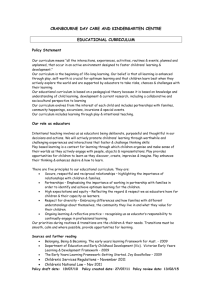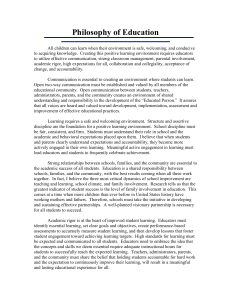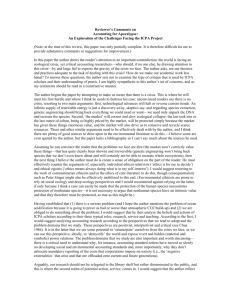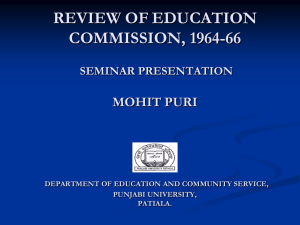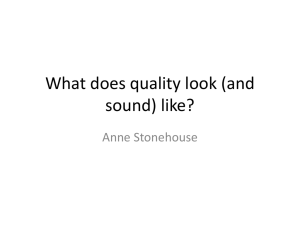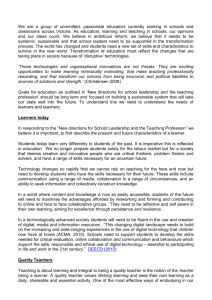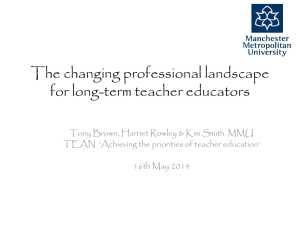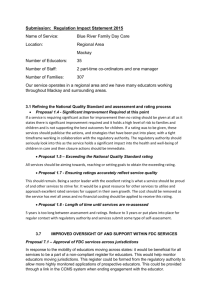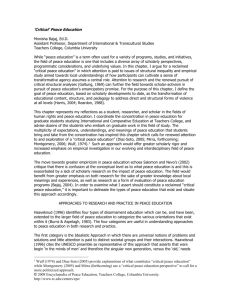Doing Cultural Studies: Youth and the Challenge of Pedagogy
advertisement
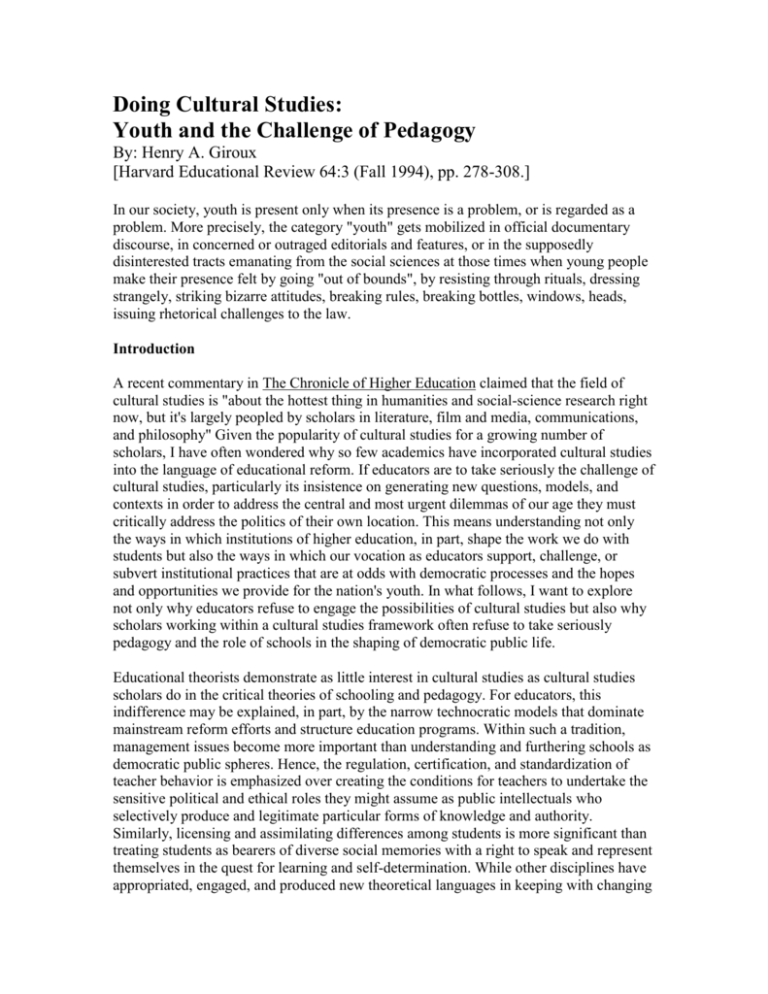
Doing Cultural Studies: Youth and the Challenge of Pedagogy By: Henry A. Giroux [Harvard Educational Review 64:3 (Fall 1994), pp. 278-308.] In our society, youth is present only when its presence is a problem, or is regarded as a problem. More precisely, the category "youth" gets mobilized in official documentary discourse, in concerned or outraged editorials and features, or in the supposedly disinterested tracts emanating from the social sciences at those times when young people make their presence felt by going "out of bounds", by resisting through rituals, dressing strangely, striking bizarre attitudes, breaking rules, breaking bottles, windows, heads, issuing rhetorical challenges to the law. Introduction A recent commentary in The Chronicle of Higher Education claimed that the field of cultural studies is "about the hottest thing in humanities and social-science research right now, but it's largely peopled by scholars in literature, film and media, communications, and philosophy" Given the popularity of cultural studies for a growing number of scholars, I have often wondered why so few academics have incorporated cultural studies into the language of educational reform. If educators are to take seriously the challenge of cultural studies, particularly its insistence on generating new questions, models, and contexts in order to address the central and most urgent dilemmas of our age they must critically address the politics of their own location. This means understanding not only the ways in which institutions of higher education, in part, shape the work we do with students but also the ways in which our vocation as educators support, challenge, or subvert institutional practices that are at odds with democratic processes and the hopes and opportunities we provide for the nation's youth. In what follows, I want to explore not only why educators refuse to engage the possibilities of cultural studies but also why scholars working within a cultural studies framework often refuse to take seriously pedagogy and the role of schools in the shaping of democratic public life. Educational theorists demonstrate as little interest in cultural studies as cultural studies scholars do in the critical theories of schooling and pedagogy. For educators, this indifference may be explained, in part, by the narrow technocratic models that dominate mainstream reform efforts and structure education programs. Within such a tradition, management issues become more important than understanding and furthering schools as democratic public spheres. Hence, the regulation, certification, and standardization of teacher behavior is emphasized over creating the conditions for teachers to undertake the sensitive political and ethical roles they might assume as public intellectuals who selectively produce and legitimate particular forms of knowledge and authority. Similarly, licensing and assimilating differences among students is more significant than treating students as bearers of diverse social memories with a right to speak and represent themselves in the quest for learning and self-determination. While other disciplines have appropriated, engaged, and produced new theoretical languages in keeping with changing historical conditions, colleges of education have maintained a deep suspicion of theory and intellectual dialogue and thus have not been receptive to the introduction of cultural studies. Other considerations in this wilful refusal to know would include a history of educational reform which has been overly indebted to practical considerations that often support a long tradition of anti-intellectualism. Moreover, educators frequently pride themselves on being professional, scientific, and objective. Cultural studies challenges the ideological and political nature of such claims by arguing that teachers always work and speak within historically and socially determined relations of power. Put another way, educators whose work is shaped by cultural studies do not simply view teachers and students either as chroniclers of history and social change or recipients of culture, but as active participants in its construction. The resistance to cultural studies may also be due to the fact that it reasserts the importance of comprehending schooling as a mechanism of culture and politics, embedded in competing relations of power that attempt to regulate and order how students think, act and live. Since cultural studies is largely concerned with the critical relationship among culture, knowledge, and power, it is not surprising that mainstream educators often dismiss cultural studies as being too ideological, or simply ignore its criticisms regarding how education generates a privileged narrative space for some social groups and a space of inequality and subordination for others. Historically schools and colleges of education have been organized around either traditional subject based studies (math education) or into largely disciplinary/administrative categories (curriculum and instruction). Within this type of intellectual division of labor, students generally have had few opportunities to study larger social issues. This slavish adherence to structuring the curriculum around the core disciplinary subjects is at odds with the field of cultural studies whose theoretical energies are largely focused on interdisciplinary issues, such as textuality and representation refracted through the dynamics of gender, sexuality, subordinate youth, national identity, colonialism, race, ethnicity, and popular culture. By offering educators a critical language through which to examine the ideological and political interests that structure reform efforts in education such as nationalized testing, standardized curriculum, and efficiency models, cultural studies incurs the wrath of mainstream and conservative educators who often are silent about the political agendas that underlie their own language and reform agendas.

